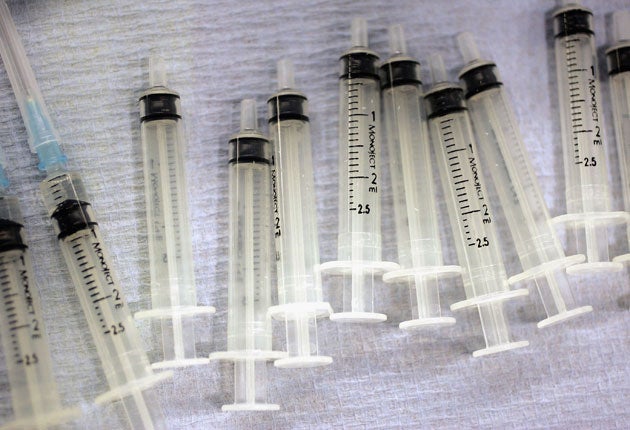NHS faces more cuts as savings targets are missed
Row over reforms will lead to recruitment freezes, longer waiting lists and shorter hospital stays

Your support helps us to tell the story
From reproductive rights to climate change to Big Tech, The Independent is on the ground when the story is developing. Whether it's investigating the financials of Elon Musk's pro-Trump PAC or producing our latest documentary, 'The A Word', which shines a light on the American women fighting for reproductive rights, we know how important it is to parse out the facts from the messaging.
At such a critical moment in US history, we need reporters on the ground. Your donation allows us to keep sending journalists to speak to both sides of the story.
The Independent is trusted by Americans across the entire political spectrum. And unlike many other quality news outlets, we choose not to lock Americans out of our reporting and analysis with paywalls. We believe quality journalism should be available to everyone, paid for by those who can afford it.
Your support makes all the difference.The political row over the coalition's NHS reforms will wipe out hundreds of millions of pounds in planned cost savings, which will have to be found in further cuts elsewhere, ministers will be forced to admit this week.
The rewriting of Andrew Lansley's flagship plan to hand GPs control of £80bn in health spending is expected to mean projected benefits are downgraded by up to 10 per cent, putting in jeopardy a fiercely ambitious target to save £20bn by 2015.
As a result, recruitment freezes will become more widespread, waiting lists are already on the rise and moves will be made to cut hospital stays, drugs bills and back-office staff.
Under Mr Lansley's original proposals, the changes were projected to secure £5bn in savings over this Parliament, and £1.7bn a year after that. But a new impact assessment, taking into account concessions to the Liberal Democrats, doctors' leaders and patients groups, could slash that total by up to 10 per cent.
The Health and Social Care Bill returns to the Commons on Tuesday, with growing signs of a political revolt. Andrew George, the Lib Dem MP leading the rebellion against the Bill, said ploughing ahead with a major structural overhaul against a backdrop of the savings programme was equivalent to "dropping an atom bomb in the middle of what is already the biggest challenge the NHS has ever faced". Under the reforms, primary care trusts and strategic health authorities (SHA) will be scrapped, and health service planning carried out by consortia of GPs, with patients and other health professionals.
This weekend the Labour Party and unions staged 60 protests nationwide against the reforms. In a sign of the axe already falling on health spending, figures show trusts have cut training budgets for this year by more than £25m – 0.65 per cent in real terms.
John Healey, the shadow Health Secretary, said: "These documents show the effect on the ground of David Cameron's broken promises on NHS funding. Cuts to education and training budgets could see fewer doctors, nurses and dentists in the years to come."
Later this month, SHAs will be told to publish plans for how they will help the NHS save £20bn by 2015. Under Labour, David Nicholson, the NHS chief executive, demanded £15bn-£20bn by 2013-14 as part of the Quality, Innovation, Productivity and Prevention (QIPP) programme, with the funds reinvested in frontline services. As a result, the target is known as the Nicholson Challenge. The coalition amended the target to £20bn by 2014-15, and with a real-terms fall in funding for the NHS next year – from £103bn to £102.86bn – times are going to be tough, with the emphasis on doing more with less. Last year trusts achieved only around 80 per cent of planned savings.
The National Audit Office is to publish a report in the next two weeks on progress towards meeting this year's targets. Stephen Dorrell, the Tory chairman of the health select committee, said the savings were "a huge, immense challenge" and it was not yet clear if they were realistic at a time of major upheaval. "There will be a lot of debate about organisational structures but the thing that will impact on the lives of the people who work in the health service and the patient experience of those using it will be the response to Nicholson."
Chris Ham, the chief executive of the King's Fund think tank, added: "With emerging evidence that the NHS is facing significant financial and operational pressures, it is essential to move on from the uncertainty and instability of the last few months and focus on meeting this challenge."
Early indications from trusts across the country suggest achieving tough savings targets is far from certain. In Birmingham, a new "cluster" of PCTs risks a £44m shortfall in its savings plans, while Mid Essex PCT has raised fears of a £9.4m shortfall. A finance report for the Kent and Medway cluster in July warned of a "high risk" that West Kent PCT will not meet its target for £38m in savings. Even large hospitals are not immune to the funding crisis. Imperial College trust has a target to save £70m this year, but only has plans in place to recoup £45m.
A Department of Health spokesman said: "We are confident that the local NHS has robust plans in place to cut waste and deliver up to £20bn of efficiency savings by 2014-15, while maintaining or improving quality."
Join our commenting forum
Join thought-provoking conversations, follow other Independent readers and see their replies
Comments